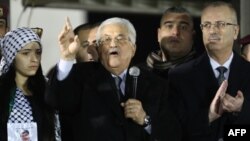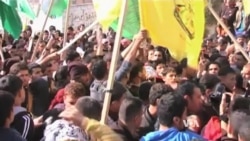Palestinian President Mahmoud Abbas on Wednesday signed a Palestinian request to join the International Criminal Court, a day after a bid for independence by 2017 failed at the U.N. Security Council.
Palestinians hope the move, certain to anger Israel and the U.S., could open the door for war crimes prosecutions against Israeli officials for their actions in the occupied territories.
“They attack us and our land every day. To whom are we to complain? The Security Council let us down. Where are we to go?” Abbas told a gathering of Palestinian leaders in remarks broadcast on official television.
He had threatened to join the international court if Tuesday's Security Council resolution failed. Late Wednesday, Abbas also signed applications for Palestinian membership in 20 other international organizations.
Watch related video report by Henry Ridgwell
Israel, US reaction
In response Wednesday, Israeli Prime Minister Benjamin Netanyahu said the move would expose the Palestinians to prosecution over support for what he called the terrorist Hamas Islamist group.
“We will take steps in response and defend Israel's soldiers,” Netanyahu said in a statement.
"The Palestinian Authority has more to fear, having formed a government with Hamas, a known terrorist organization and which like the Islamist State [group] commits war crimes," he said.
U.S. State Department spokesman Edgar Vasquez said America strongly opposed the move and warned it would be "counterproductive and do nothing to further the aspirations of the Palestinian people for a sovereign and independent state."
Vasquez added, "It will badly damage the atmosphere with the very people with whom they ultimately need to make peace."
The U.N. formed the court to prosecute suspects accused of genocide, war crimes and other crimes against humanity. It has no power to make arrests but does have the authority to issue arrest warrants, which could make it a problem for suspects to travel.
Leading up to the failed independence bid before the Security Council, Sweden recognized Palestinian statehood, and the parliaments of France, Britain and Ireland passed nonbinding motions urging their governments to do the same.
Tuesday's vote
Late Tuesday, though, the 15-member council voted against the draft resolution, which demanded that Israel withdraw from the occupied territories.
There were eight votes in favor of the measure, two against and five abstentions. Australia and the United States voted against the resolution.
Even if the measure had received the nine votes needed for passage, the U.S. vote against it would have effectively vetoed the resolution.
U.S. Ambassador to the U.N. Samantha Power said that Israeli-Palestinian peace could come only from "hard choices and compromises" and that the resolution would not move the sides closer to a two-state solution.
"We voted against this resolution not because we are indifferent to the daily hardships or the security threats endured by Palestinians and Israelis, but because we know that those hardships will not cease and those threats will not subside until the parties reach a comprehensive settlement achieved through negotiations," Power said.
The U.S. objections were understandable, said professor Rosemary Hollis of City University London.
"If Israel is not agreed to withdrawing from the territories the Israelis occupied in 1967, including East Jerusalem, which clearly they are not at the moment, then who exactly would oblige them to make that withdrawal?” she said.
Netanyahu offers praise
Netanyahu praised the U.N. vote, thanking the United States, Australia, Rwanda and Nigeria. Rwanda and Nigeria were two of the five countries that abstained, joined by Britain, Lithuania and South Korea. Russia, China, France, Argentina, Chad, Chile, Jordan and Luxembourg voted in favor of the resolution.
Emanuel Nachshon, a spokesman for the Israeli Foreign Ministry, said, "We hope that the Palestinians understand that the only way to move forward with the peace process is by negotiating with Israel and not by continuing this unilateral strategy.”
Riyad Mansour, the Palestinian representative to the U.N., criticized the council and said it was not fulfilling its responsibilities.
"The Security Council has once again failed to uphold its charter duties to address these crises and to meaningfully contribute to a peaceful and lasting solution in accordance with its own resolutions," he said.
Russian U.N. envoy Vitaly Churkin called the council's rejection a "strategic mistake" and accused the U.S. of monopolizing Israel-Palestinian peace talks.
Despite the loss, the Palestinian Authority can draw some positives from the vote, said Yossi Mekelberg of the London-based policy group Chatham House.
With the eight votes in favor of passage, “there is a majority, even within the Security Council, let alone in the General Assembly, there is support in recognizing an independent Palestinian state,” he said.
The draft would have given Israel until the end of 2017 to pull out of the West Bank and Gaza back to the pre-1967 war borders. It also called for Israel and the Palestinians to reach a peace deal within one year.
The French news agency AFP quoted a Hamas spokesman criticizing Abbas, saying that the push for a Security Council resolution was a "unilateral decision" and that he had "taken the Palestinian decision-making process hostage."
More than half a million Israelis live in settlements on occupied land — which most of the international community sees as illegal. Israel approved 250 more homes in East Jerusalem last week, and it claims the settlements are consistent with international law.
Tensions in the region remain high. On Tuesday, thousands of Palestinians attended the funeral of a 16-year-old boy who was killed by Israeli troops after hurling rocks at settler vehicles in the West Bank. An 11-year-old Israeli girl was badly wounded in a firebomb attack on her family’s car in the West Bank last week.
Clarification: This story was updated to clarify that, while the U.S. vote against the Palestinian statehood measure had the effect of a veto, U.S. veto power was not needed because the resolution did not get the required nine votes to pass.
Some material for this report came from VOA's Henry Ridgwell in London, as well as Reuters, AFP and AP.







